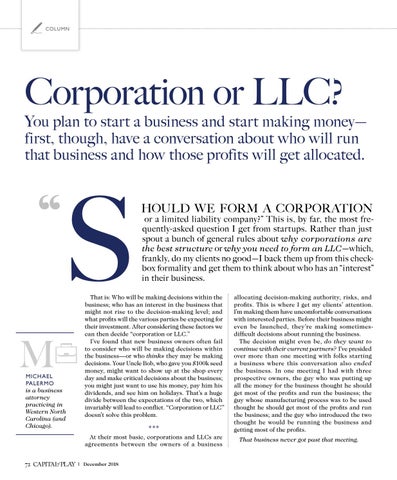column
Corporation or LLC?
You plan to start a business and start making money— first, though, have a conversation about who will run that business and how those profits will get allocated.
“S
M michael palermo
is a business attorney practicing in Western North Carolina (and Chicago).
HOULD WE FORM A CORPOR ATION
or a limited liability company?” This is, by far, the most frequently-asked question I get from startups. Rather than just spout a bunch of general rules about why corporations are the best structure or why you need to form an LLC—which, frankly, do my clients no good—I back them up from this checkbox formality and get them to think about who has an “interest” in their business.
That is: Who will be making decisions within the business; who has an interest in the business that might not rise to the decision-making level; and what profits will the various parties be expecting for their investment. After considering these factors we can then decide “corporation or LLC.” I’ve found that new business owners often fail to consider who will be making decisions within the business—or who thinks they may be making decisions. Your Uncle Bob, who gave you $100k seed money, might want to show up at the shop every day and make critical decisions about the business; you might just want to use his money, pay him his dividends, and see him on holidays. That’s a huge divide between the expectations of the two, which invariably will lead to conflict. “Corporation or LLC” doesn’t solve this problem.
***
At their most basic, corporations and LLCs are agreements between the owners of a business 72
| December 2018
allocating decision-making authority, risks, and profits. This is where I get my clients’ attention. I’m making them have uncomfortable conversations with interested parties. Before their business might even be launched, they’re making sometimesdifficult decisions about running the business. The decision might even be, do they want to continue with their current partners? I’ve presided over more than one meeting with folks starting a business where this conversation also ended the business. In one meeting I had with three prospective owners, the guy who was putting up all the money for the business thought he should get most of the profits and run the business; the guy whose manufacturing process was to be used thought he should get most of the profits and run the business; and the guy who introduced the two thought he would be running the business and getting most of the profits. That business never got past that meeting.
